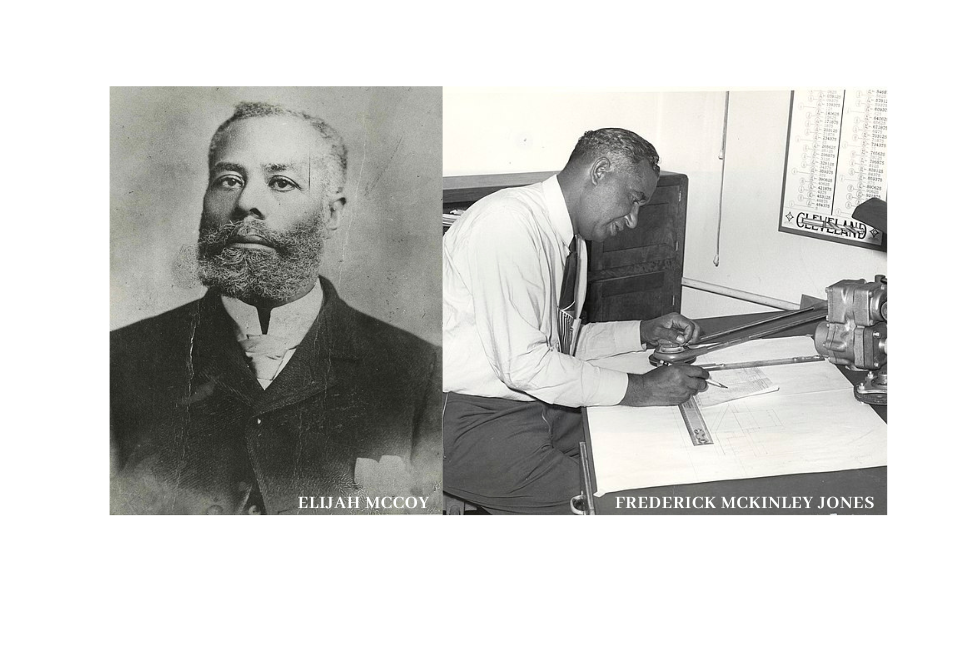
Black History Month is every month here at Clean Water Action! To continue our celebration, please check out this special blog post which highlights a few extraordinary Black historical icons that made significant contributions in America’s freight and goods movement industry! Their ingenuity, creativity and hard work revolutionized the freight and goods movement industry across the country. It is so important to acknowledge them and their inventions not just during Black History Month, but every day! See them and know them!
Frederick McKinley Jones
Our First spotlight is on Frederick McKinley Jones, born in Covington, Kentucky on May 17, 1893. Despite losing his mother at the tender age of 9 and dropping out of school, he worked as an electrician in France during World War I. This experience is what first sparked his interest in machinery and ultimately led Jones to becoming an inventor and engineer. He made significant contributions like the invention of the “snow machine” vehicle which aided in travel in the winter, building and designing cars for racing at county fairs, ticket-dispensing system for box offices and changing previously silent movie projectors to work with talking films.
His biggest contribution in the trucking and logistics industry was inventing the first reliable refrigeration system for long-haul trucks, which changed the way perishable goods were transported across the country.
This invention led to the birth of “ThermoKing Corporation” established in 1935 which still remains a crucial part of the refrigeration industry. In 1949, Jones received a patent for the invention. It was later used in other forms of shipping, like ocean carriers. Jones’ invention was the start of year-round fresh produce shipments. His invention led to the creation of an air-conditioned unit to store blood and medicines for field hospitals and refrigeration for field kitchens, which helped America during World War II.
After his death on Feb. 21, 1961, He became honored posthumously as the first African American inventor to receive the National Medal of Technology and Innovation.
Elijah McCoy
Elijah McCoy deserves our next recognition. His parents escaped slavery during the Underground Railroad, which led them to Canada where Elijah was born in 1844. They later returned to Michigan a few years later. At 15, McCoy traveled to Scotland to receive training to become a mechanical engineer. Upon receiving his certification, McCoy relocated back to the US. Racial barriers made it difficult for McCoy to hold skilled positions he was qualified for, which led to his early beginnings as a worker for the Michigan Central Railroad (MCR).
While working for MCR, McCoy was inspired to invent the “lubrication cup” - a device that dispenses oil evenly throughout an engine, prolonging the train run times without having to stop for maintenance. He obtained a patent for the cup soon after and was later credited for about 60 patents, mostly focused on lubrication systems and machinery. Unfortunately, his name was not featured on many of the products he invented, due to lack of access to capital for Black Americans. He often sold his patent rights to investors or allowed his employers to own the rights. In 1920, he created the Elijah McCoy Manufacturing Co. where lubrication products were branded with his name. He passed away in 1929 at 85 years old. Some of the inventions mentioned are still used in freight and goods movement -especially in ports and warehouse operations.
Unfortunately, the exponential growth of port and warehouses operations in NJ hasn’t been the most environmentally friendly. Toxic air pollution caused by ports and warehouse industries has been impacting overburdened communities for decades. The regulations that do exist do not go far enough to protect local residents and workers.
That's why Clean Water Action is advocating for the NJ warehouse and port pollution bill (A4679/S3546) which aims to curb pollution at warehouses, ports and other truck attracting facilities. This bill would require them to implement concrete emission reduction measures through an “indirect source review” program.
Take action today by urging your NJ State Senator and Assemblyperson to ADVANCE A4679/S3546 immediately! The lives of frontline and overburdened communities impacted by truck pollution from our ports and warehouses cannot wait any longer.
Contact Your Legislators Here!
Happy Black History Month (all year long!) and may the fight for cleaner and sustainable freight and goods movement system continue until Environmental Justice has been served for all!


